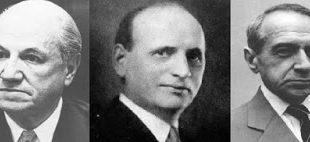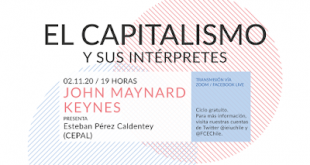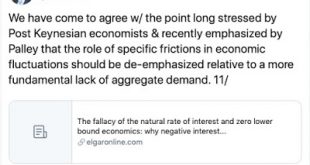[embedded content]A shorter version at the ISET conference of my Will Lyons Lecture at Franklin & Marshall. And yes, I think Harrod and Skidelsky were right (not Crotty and O'Donnell). He was definitely an Asquith Liberal.
Read More »New Working Paper: Keynes’s finance, the monetary and demand-led circuits: a Sraffian assessment
Keynes’s finance, the monetary and demand-led circuits: a Sraffian assessment Working Paper n.851 - Marzo 2021Sergio Cesaratto DEPS, USiena Riccardo Pariboni DEPS, USiena Abstract This paper aims to stimulate the convergence of the Sraffian approach to demand-led growth theory with insights from monetary circuit theory and stock-flow models. The first Sraffian contribution to this convergence we...
Read More »A delightful read
Recensione su Brave New Europe Grazie Mat! Heterodox Challenges in Economics by Sergio Cesaratto February 24, 2021 Book Review by Mathew D. Rose I never thought that I would describe an economics book as “a delightful read”, but “Heterodox Challenges in Economics” by Sergio Cesaratto is exactly that. It is well written, often entertaining and humorous, and explains a great deal about political economy, which is then applied in an analysis of the...
Read More »Prebisch’s Critique of Bretton Woods Plans
Prebisch, Williams and KaleckiNew Working Paper with Esteban Pérez at the networkideas. From the abstract:The name and work of Raúl Prebisch are often associated with the problem of long-term economic development in Latin America. Less well known and explored is Prebisch’s contribution to the study of the monetary and financial problems of the countries of the periphery in relation to those of the center. Prebisch analyzed the post-WW-II monetary plans of John Maynard Keynes and Harry Dexter...
Read More »Esteban Pérez on John Maynard Keynes
One of my favorite economists, and John Maynard Keynes too. Don't miss this lecture, in Spanish of course, on one of the central economists of the 20th century and its relevance for the periphery, particularly during the current pandemic. I'll post links to the Zoom and Facebook stream soon.
Read More »Do current times vindicate Keynes and is New Keynesian macroeconomics Keynesian?
Thomas I. Palley, Esteban Pérez Caldentey and Matías Vernengo Professor Robert Rowthorn delivered the second annual Godley–Tobin lecture in New York City on 1 March 2019. The title of his lecture was ‘Keynesian economics – back from the dead?’ and it is published in this issue of the Review of Keynesian Economics. The lecture was attended by a large audience and the Question & Answer session provoked a stimulating discussion. Prompted by that discussion, we thought it would be...
Read More »New Book on Roy Harrod
Esteban Pérez Caldentey has just published a new book on Roy Harrod for the collection edited by Anthony Thirlwall. From the description: This landmark book describes and analyzes the original contributions Sir Roy Harrod made to fields including microeconomics, macroeconomics, international trade and finance, growth theory, trade cycle analysis and economic methodology. Harrod’s prolific writings reflect an astounding and unique intellectual capacity, and a wide range of interests. He...
Read More »Larry Summers on the necessity of fiscal expansions
As noted before, Larry Summers argues that Post Keynesians and original Keynesians (arguably Keynes and those close to him) did not think in terms of imperfections. The op-ed version of the Tweets here. He says, on the topic of secular stagnation and the lower zero bound that: This formulation of the secular stagnation view is closely related to the economist Thomas Palley’s recent critique of “zero lower bound economics”: negative interest rates may not remedy Keynesian unemployment....
Read More »Larry Summers on Effective Demand
On of the issues between more mainstream Keynesians and their more heterodox counterparts is whether frictions are central for Keynesian results or not. Since the Neoclassical Synthesis the conventional view is that some rigidity or friction was behind the problems of unemployment, be that the liquidity trap (the Keynesian case with the flat LM, since Hicks 1937), the rigidity of wages (since Modigliani 1944), or some other coordination problem (mostly in the New Keynesian literature).In...
Read More »HOW TO PAY FOR THE WAR
Remarks by L. Randall Wray at “The Treaty of Versailles at 100: The Consequences of the Peace”, a conference at the Levy Economics Institute, Bard College, May 3, 2019. I’m going to talk about war, not peace, in relation to our work on the Green New Deal—which I argue is the big MEOW—moral equivalent of war—and how we are going to pay for it. So I’m going to focus on Keynes’s 1940 book— How To Pay for the War—the war that followed the Economic Consequences of the Peace. Our analysis...
Read More » Heterodox
Heterodox






